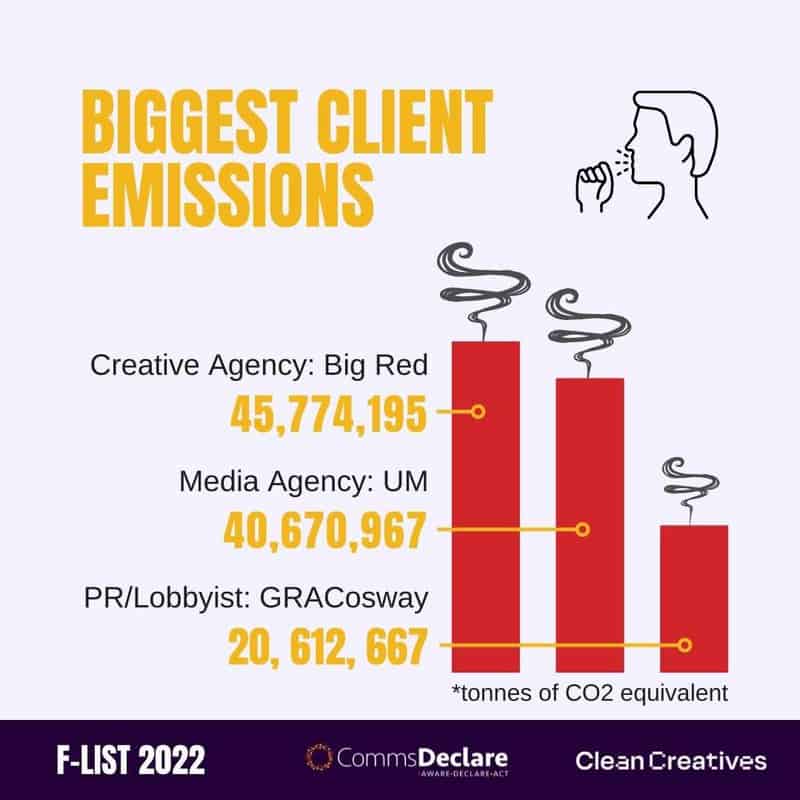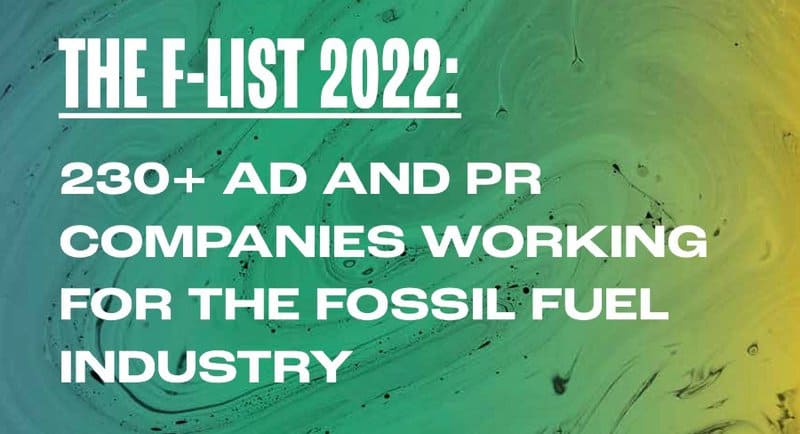The F-List 2022 has unmasked the advertising, media, and PR agencies working with and promoting climate-polluting companies and the fossil fuel industries.
The report, by campaign groups Clean Creatives and Comms Declare, named 239 agencies around the world who have done recent work for such organisations.
Key findings from the F-List analysis found:
• 239 agencies have done recent work with fossil fuel companies. The vast majority of this work is not shared via agency channels, or with clients whose work may be affected by greenwashing claims.
• At least 17 agencies are working for Saudi Aramco, the world’s largest polluter, including a previously undisclosed Interpublic Mediabrands agency, Well7. Interpublic agencies McCann, UM, and Jack Morton have also led substantial work for Aramco, but all holding companies have some connection to the world’s largest oil company, and funder of human rights abuses.
• The world’s biggest coal exporter, Glencore is being referred to Australian regulators over a brand campaign ad that features EVs, solar panels and wind turbines – but doesn’t mention coal. Comms Declare understands Bastion Creative is behind the campaign. This complaint follows the barring of two employees of Anacta Strategies from lobbying the Queensland government. Glencore secured a lucrative bailout while employing Anacta.
• Edelman retains its role as the independent agency doing the most work for fossil fuel companies, despite a pledge in early 2022 to review its client policy. Some small signs of progress at the PR giant can be seen, but the company remains committed to working with polluters.
The F-List list revealed the top polluting agencies in Australia across several categories, using Scope 1 and 2 emissions data from their clients. It also revealed the agencies who made the biggest client emissions: creative agency Big Red, media agency UM and PR/lobbyist GRACosway.

Belinda Noble, founder of Comms Declare, said: “Big Red won the big prize nobody wanted – AGL’s creative account and, combined with its work for BHP, its Scope 3 emissions now represent more than 10% of Australia’s total greenhouse gas pollution – on par with Libya’s annual emissions.
“We calculate UM’s Scope 3 emissions are more than Finland’s, also thanks to their work with AGL. GRACosway is the most polluting lobbyist, with clients including Santos, Glencore and BHP, meaning its total client emissions are around 5% of Australia’s, or about the same as Kenya’s.
“Meanwhile GRACosway’s owner Omnicom somewhat hypocritically claims to be ‘actively working to harness our advertising power and influence to promote sustainable consumer choices and behaviors.”
The F-list report also revealed the agencies making an effort to improve its emissions output, among them is international coal giant Glencore following a bribery, price fixing scandal and refusal to exit Russia amid the Ukraine crisis.
The report noted that it is Glencore International doubled its annual expenditure on lobbyists to just under $400k. The company also expanded its marketing efforts in Australia, employing four lobbying firms; Omnicom’s GRACosway, Nexus APAC, Capital Hill Advisory and Anacta Strategies.
Glencore increased its Australian marketing efforts by hiring four lobbying firms (GRACosway, NEXUS APAC, Capital Hill Advisory, Anacta Strategies) and five other agencies (Bastion Creative, Brother & Co, Wahoo, Adoni Media, Campaign Edge Sprout).
Noble added: “At least nine Australian advertising and PR agencies are helping coal giant Glencore portray itself as part of a clean energy future while the company is actually expanding coal operations.
“Agency executives need to wake up and realise they are actively helping the corporations creating global warming, which is generating unprecedented disasters around the globe.”
Duncan Meisel, Clean Creatives executive director, said: “Advertising and PR companies have had decades of warnings that their relationships with fossil fuel companies are harming their reputation, and their clean clients.
“Until now, executives have chosen to ignore those warnings, with serious consequences for the planet, and their ability to attract and retain young talent,” he said.
“Hundreds of agencies have pledged not to work with fossil fuels because working with polluters is bad for business, and bad for the planet,” Meisel added.
